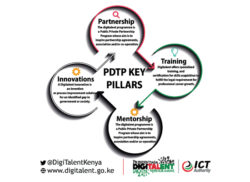
Business Process Outsourcing, also known as Information Technology Enabled Services (BPO/ITES) involves the transfer of value contributing activities and processes to another firm to reduce the operating costs, for better quality and the ability to focus on core competence.
It is simply the movement of business processes from inside the organisation to an external service provider. The term encompasses a range of activities that include customer service work, data entry, transcription, digitisation, financial accounting, auditing and other higher value-knowledge processing such as content development, animation, legal services, engineering design, and data analytics.
With the global telecommunications infrastructure now well established and consistently reliable, the BPO industry is expected to help Kenya realise its development goals. The Kenya Vision 2030 development blueprint identifies BPO as a key sector under the economic pillar and has played a big role in the growth and development of a knowledge-based economy and opening a window for thousands of jobs to unemployed youths in the country.
Further, BPO has continued to provide business services via the internet to companies and organisations in developed countries. Kenya’s Third Medium Term Plan (MTP III) 2018-2022 had envisaged attracting top international IT suppliers, leading multinational corporations, and foreign companies with top BPO brands.
The sector is expected to create over 200,000 direct jobs and contribute towards the achievement of ICT sector Target of 10% of Gross Domestic Product (GDP). In order to bridge the digital divide and promote innovation and creativity, the Plan had focused on the promotion of Kenya as a Business Process Outsourcing (BPO) destination as well as enhancing development capacities for science, technology and innovation.
Programmes and projects in the BPO/ITES sector are ongoing and include the establishment of a Smart City (Konza Technopolis); Digital Literacy Programme; provision of mentorship to youth on online digital work; exploiting digitally-enabled job opportunities; and equipping youth with skills and access to the available information.
There is also a focus on identifying opportunities in the investment, trade and manufacturing sectors making Kenya a hub of BPO/ITES and e-commerce services. The sector will continue to improve public information management and awareness creation on BPO/ITES opportunities through gathering, packaging, and dissemination of news and information on the development, implementation, and review of related policies, projects, and programmes.
The BPO/ITES is a priority sector under the Economic Pillar of the Kenya Vision 2030. The main goal under the BPO is to create employment opportunities and contribute significantly to the GDP.
BPO is an integral part of the day-to-day business activities, including healthcare, retail and e-commerce, banking, asset management, supply chain management, and business services. The government and other stakeholders in the sector have implemented various initiatives identified in MTPIII. This has enabled the BPO/ITES to contribute significantly towards the ICT overall contribution to GDP from 1.4 per cent in 2017 to 2.5 per cent in 2020.
Presidential Digital Talent Programme
The objective is to provide apprenticeships to ICT graduates in both private and public organisations. A total of 1,600 graduates have benefitted from the programme in the last four years.
Establishment of Studio Mashinani
The objective of the project is to enhance youth talent through the establishment of production studios to empower talented youths to record their music and other digital content for commercial purposes locally. Four Studio Mashinani were established in Gatanga, Kitui, Eldoret, and Kisii towns. A total of 145 productions have been made in the studios.
Promotion of Film Industry
The objective is to promote the development of high-quality, easily accessible, relevant local digital content and to make Kenya the destination for African content.
Two (2) Regional Film Incubation Centres were established in Migori and Bomet. The government also acquired and refurbished the Nairobi Cinema Theatre. The Kenya Film school was also established at Moi International Sports Centre.
Ajira Digital Programme
The aim of the project is to train, empower and expose the youth to online jobs. The sector increased the number of trained youths under Ajira Digital Programme from 21,105 in 2018 to 91,615 in 2021 and over 100 institutions have also been trained.
The number of youths working on digital and/or digitally-enabled jobs increased from 1,227,850 to 1,942,609 within the same period. The sector engaged 878 youths who worked on Judiciary Transcription jobs, scanning, and data entry through the Ajira Digital Programme. The sector established and operationalised 339 and utilised Ajira Youth Empowerment Centres (AYEC) in 200 constituencies. The Ajira digital curriculum was reviewed and an Ajira Digital Trainer Manual was developed.
Digital Media City
The goal of the project is to position Kenya as a global filming and investment location in Africa. The specific objective is to create a new content producing a platform for entertainment, media, and tourism; and to promote entertainment and media industry start-ups. The pre-feasibility study for the project located at Konza Technopolis has been completed.
